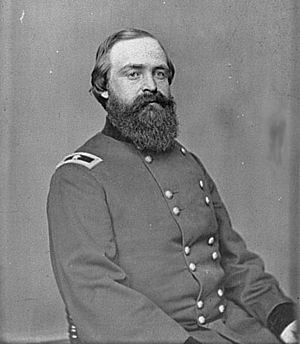John C. Caldwell facts for kids
Quick facts for kids
John Curtis Caldwell
|
|
|---|---|

John C. Caldwell
|
|
| Born | April 17, 1833 Lowell, Vermont |
| Died | August 31, 1912 (aged 79) Calais, Maine |
| Place of burial |
St. Stephen Rural Cemetery, St. Stephen, New Brunswick, Canada
|
| Allegiance | United States of America Union |
| Service/ |
United States Army Union Army |
| Years of service | 1861–1866 |
| Rank | |
| Commands held | 11th Maine Volunteer Infantry Regiment II Corps |
| Battles/wars | American Civil War: |
| Other work | Lawyer, Diplomat |
John Curtis Caldwell (born April 17, 1833 – died August 31, 1912) was an important person in American history. He was a teacher, a general for the Union Army during the American Civil War, and later a diplomat for the United States.
Contents
Early Life and Education
John Caldwell was born in Lowell, Vermont. He went to Amherst College and finished his studies in 1855. After college, he moved to Maine. There, he became the principal of the Washington Academy in East Machias. This means he was the head teacher or director of the school.
Service in the Civil War
When the Civil War began, John Caldwell was 28 years old. He had no military training before this time. However, his leadership skills as a school principal impressed many people. Because of this, he was chosen to be a colonel for the 11th Maine Infantry regiment in November 1861.
Rising Through the Ranks
Caldwell quickly moved up in rank. In April 1862, he became a brigadier general. He then took charge of a group of soldiers called the 1st Brigade. This happened during the Peninsula Campaign. He stepped in after the previous commander was hurt in a battle.
Key Battles and Challenges
General Caldwell showed bravery in several battles. At the Battle of Glendale, he helped another Union division that was in trouble.
He also fought in the Battle of Antietam in September 1862. During this battle, he briefly led his division when its main commander was wounded. Caldwell himself was hurt in this fight. He was wounded two more times at the Battle of Fredericksburg in December. Even with these injuries, he continued to lead his soldiers.
At the Battle of Chancellorsville in May, his brigade did well. They helped cover the army's retreat, which means they protected the soldiers as they pulled back.
The Battle of Gettysburg
One of Caldwell's toughest experiences was at the Battle of Gettysburg on July 2, 1863. He was in charge of the 1st Division of the II Corps. His division arrived at the battlefield and waited as a reserve.
Later that afternoon, a strong attack from the Confederate army began. Caldwell's division was ordered to help the Union III Corps. He moved his soldiers quickly. They launched a large attack, but the Confederate forces hit their side. This caused confusion and made Caldwell's division retreat.
After Gettysburg, Caldwell's role in the army changed. In March 1864, the army was reorganized. He was then moved out of combat command and did not fight in any more battles.
Life After the War
After the Civil War ended, John Caldwell was part of the honor guard for Abraham Lincoln's funeral train. He was promoted to major general in August 1865. He left the military service in January 1866.
Caldwell then became a lawyer and served in the Maine Legislature, which is like a state government. He also worked as the adjutant general for the Maine Militia from 1867 to 1869.
A Career in Diplomacy
John Caldwell then started a new career as a diplomat for the United States. He served in several important roles:
- He was the U.S. Consul in Valparaíso, Chile, from 1869 to 1874. A consul helps protect the interests of their country's citizens abroad.
- He was the U.S. Minister to Uruguay and Paraguay from 1874 to 1882. A minister is a high-ranking diplomat who represents their country.
- He was also the U.S. Consul to San José, Costa Rica, from 1897 to 1909.
John Caldwell passed away in Calais, Maine, on August 31, 1912. He is buried in St. Stephen Rural Cemetery in St. Stephen, New Brunswick, Canada.

